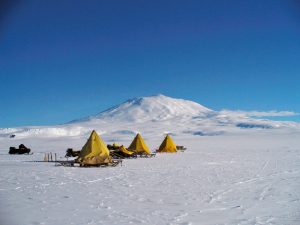Space missions begin long before lift-off. In its preparation for America’s first Journey to Mars, NASA will collaborate with the Nation Science Foundation to study effects of isolation, confinement, and extreme environments on people. These effects, known by the acronym ICE, that astronauts will encounter on their expeditions to outer space can be difficult to simulate – in particular, the extreme environments. Antarctica provides the closest setting to what the astronauts will experience, and as such is the best location for the behavioral studies to take place.
Dr. Candice Alfano developed an initial study that will analyze Antarctica’s effect on the behavior of people working there for extended periods. Dr. Alfano is a clinical psychologist, Director of the Sleep and Anxiety Center of Houston, and psychology professor at the University of Houston. Her and her researcher team hope to discover the greatest sources of stress that the study participants will face, and thereof create a checklist to detect early signs of behavioral changes brought on by ICE. The checklist will help ensure that proper intervention can take place before adverse negative effects occur. NASA considers astronaut well-being a top priority primarily because the space explorers need to be in good health to both complete their missions and problem-solve when things go wrong.
https://www.youtube.com/watch?v=wjgTeIWut4s
The results will have other implications, including aiding deployed military personnel who are more likely to suffer mental health disorders than civilians.
These efforts echo UBC in addressing mental health issues on campus, and hopefully the data can eventually help stressed university students.
Navpreet Ganda

